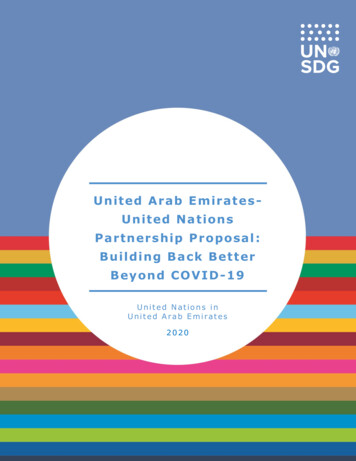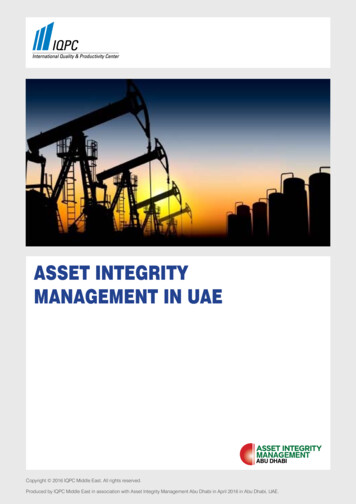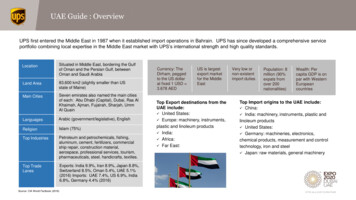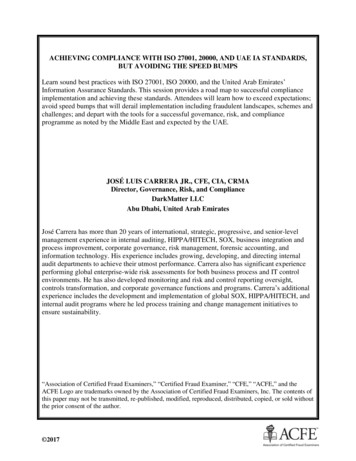
Transcription
The UAE’s Evolving National Security StrategyHussein Ibish
April 6, 2017The UAE’s Evolving National Security StrategyHussein Ibish
I s s u eP a p e r#42017The Arab Gulf States Institute in Washington (AGSIW), established in 2014, is an independent,nonprofit institution dedicated to increasing the understanding and appreciation of the social,economic, and political diversity of the Arab Gulf states. Through expert research, analysis,exchanges, and public discussion, the institute seeks to encourage thoughtful debate and informdecision makers shaping U.S. policy regarding this critical geostrategic region. 2017 Arab Gulf States Institute in Washington. All rights reserved.AGSIW does not take institutional positions on public policy issues; the views represented hereinare the author’s own and do not necessarily reflect the views of AGSIW, its staff, or its board ofdirectors.No part of this publication may be reproduced or transmitted in any form or by any meanswithout permission in writing from AGSIW. Please direct inquiries to:Arab Gulf States Institute in Washington1050 Connecticut Avenue, NWSuite 1060Washington, DC 20036This publication can be downloaded at no cost at www.agsiw.org.Cover Photo Credit: (AP Photo/Adam Schreck)
About the AuthorHussein Ibish is a senior resident scholar at the Arab Gulf States Institute in Washington. Hepreviously served as a senior fellow at the American Task Force on Palestine, executive directorof the Foundation for Arab-American Leadership, and communications director for the AmericanArab Anti-Discrimination Committee. He is a weekly columnist for The National (UAE) and a monthlycontributing writer for The International New York Times. Ibish is the author of What’s Wrongwith the One-State Agenda? Why Ending the Occupation and Peace with Israel is Still the PalestinianNational Goal (ATFP, 2009). He earned a PhD in comparative literature from the University ofMassachusetts, Amherst.
ContentsExecutive Summary1Introduction3The National Security Profile of the UAE3Military Preparedness18Relations with Iran23The Growing Emirati International Military Role27Soft Power and Financial Clout35Islamists and the Muslim Brotherhood39Cybersecurity43Counterterrorism and Human Rights45Conclusion47References51
Hussein Ibish 1Executive SummaryConfronted with serious challenges, but also blessed with remarkable assets, the United ArabEmirates has developed a distinctive, and in some ways unprecedented, national securitystrategy. The UAE is one of the smaller countries in the world, especially demographically,with only about 1.5 million citizens, but is one of the wealthiest per capita. It is the seventhlargest international petroleum producer, and possesses about 6 percent of the world’sproven oil reserves.1 It is also located in a highly strategic and volatile neighborhood, alongthe southeastern coast of the Gulf, bordering Saudi Arabia and Oman. Its northernmostpoint thrusts into the waters near a crucial maritime chokepoint, the Strait of Hormuz, and isseparated from Iran by a narrow body of water.Given its geography, demography, and natural resources, the UAE has had to cope withextraordinarily complex security concerns, and has both limitations and assets that areextremely unusual. From the time of its formation in 1971, the UAE’s national leadershiprecognized that the country’s biggest challenge was how to overcome its relatively smallpopulation. It sought to do this through careful long-term planning, including systematiceconomic and military development; investing in the country’s human capital, increasinglyincluding women, in all sectors; developing technological solutions and innovations; andimporting foreign labor. From its earliest days, the UAE sought to use its financial resourcesand the soft power of aid and development to build international friendships, promote itsperspectives, defend its interests, and enhance its reputation, particularly in Arab and Muslimcountries.The UAE has quietly built its own independent defense capabilities. Over the decades, it hasmethodically constructed relatively small but sophisticated military assets such as its air force,special forces, and high-tech offensive and defensive weaponry. As this military capability hasgrown, the country has become more willing to use force, usually in conjunction with someset of allies, to secure its vital interests. And it has deployed these hard power capacities handin hand with its more traditional soft power approaches. It is also at the beginning stages ofdeveloping its own domestic defense industry.The UAE has carefully nurtured a set of crucial strategic and military alliances, especially withSaudi Arabia and the other Gulf Cooperation Council members, as well as the United States.The country seeks to do what it can for itself, but recognizes that much of what it needs toaccomplish to secure its vital interests will have to be conducted in collaboration with others.The formation of the GCC in 1981 was a direct response to the security crisis facing the GulfArab countries due to the 1979 Iranian Revolution and the outbreak of the Iran-Iraq War in1981. The focus of the GCC and its members, including the UAE, at the time of the council’sfounding until the present day has been the defense of regional security, and stability in theface of threats emanating from Iran and regional conflicts. In important respects, the UAE hasdeveloped into Washington’s most important Gulf Arab ally, with close military and intelligencecooperation reflecting the trust and respect the Emirati military has earned from senior U.S.commanders.
The UAE’s Evolving National Security Strategy 2The UAE’s increasing willingness to act militarily to secure its interests is perhaps best reflectedin the intervention in Yemen that began in 2015, which is primarily led by Saudi Arabia in thenorth and the Emirates in the south. To support this campaign, and more broadly acquiregreater strategic depth, the UAE has recently established military bases in the Horn of Africa,most notably at Assab in Eritrea. To sustain this strategic expansion, and build on its logic, theUAE will almost certainly have to develop greater bluewater naval capabilities in the comingdecades.In addition to its conventional military capabilities, the UAE is deeply committed tocounterterrorism and counterradicalization efforts. Much of its military campaign in southernYemen focuses on counterinsurgency operations against Al-Qaeda in the Arabian Peninsulaand other extremist groups, and the UAE was an early and enthusiastic participant in the airwar in Syria against the Islamic State in Iraq and the Levant. The UAE takes the hardest line ofany Arab government, with the possible exception of Egypt, against Islamists in general, seeingthem all as part of a continuum of radicalism. It does not conflate the Muslim Brotherhoodwith al-Qaeda and ISIL or pro-Iranian Shia militias, but it does regard them all as differentiterations of extremism to be categorically opposed.In addition to counterterrorism and counterradicalization initiatives, the UAE is investingheavily in cybersecurity, using technology to combat both cyber criminals and, at times,domestic political dissidents. Human rights organizations have raised concerns regardingsome of these cases.This paper tracks the evolution of the Emirati national security strategy as it has emerged inthese contexts, emphasizing the following key points: Mobilizing all its human and natural resources, as well as technology, to compensate forthe country’s modest size and small population Building its military and other national security-related infrastructure, includingcybersecurity Seeking strategic depth through overseas military installations and the forwarddeployment of assets and capabilities Emphasizing the centrality of its strategic alliance with Saudi Arabia Maintaining close ties with the United States Engaging with the global economy and many aspects of emerging globalized culture Opposing all forms of radical Islamism Making a determined effort to limit the expansion of Iranian influence in the Arab world Using “soft power,” such as humanitarian or development aid and investments, at timesin conjunction with “hard power,” to promote its interests Maintaining and developing its crucial alliance with GCC member states, other Arabcountries, and international partners
Hussein Ibish 3This study outlines how these ambitious national security strategy pillars developed and arebeing pursued. In the process, it examines why the UAE is convinced it has few alternatives toplaying a disproportionately significant economic, diplomatic, political, and military regionalrole, and how it is acting on that conclusion. And, finally, it assesses the impact this growingEmirati role and influence is having on a range of Middle Eastern dynamics, and where theUAE fits in the strategic landscape of this unsettled but still crucial region.IntroductionOver the past decade, the small Gulf Arab country of the United Arab Emirates has becomeincreasingly prominent, playing major roles in a series of dramatic regional developments.From the battle to unseat the regime of Muammar al-Qaddafi in Libya, to the struggle in Syriaagainst the Islamic State in Iraq and the Levant, to the dramatic Arab intervention in Yemen,the UAE, a country of just 1.5 million citizens, has seemingly suddenly and out of nowherebegun to play an important regional role not just at the economic, diplomatic, and politicalregisters, but also in military and strategic terms. Yet this perhaps unexpected and arguablyeven incongruous role for such a small state was, in fact, long in the making. For many yearsthe UAE steadily built its military and strategic strength and positioned itself to play a proactiveand dynamic role in defining and defending its national and regional interests.This path began in earnest following the 9/11 terrorist attacks in the United States and theUAE’s active, if low-key, participation in the anti-Taliban campaign in Afghanistan that followed.As the country developed its capabilities and gained experience, the political earthquake ofthe Arab Spring uprisings, beginning in Tunisia at the end of 2010, rocked the region. Thiscreated a range of challenges and opportunities for the UAE and left a relative paucity ofleadership in the Arab world that the Gulf Arab countries, most notably Saudi Arabia and theUAE, had no choice but to fill.This paper examines the development of the UAE’s national security strategy from theestablishment of the federation to the present day. It attempts to summarize, contextualize,and encapsulate the growth and aims of one of the most important and dynamic growingpowers in the Gulf region and the broader Middle East. This is particularly important as theUAE’s role and significance is likely to grow in the coming years.The National Security Profile of the UAECore National RealitiesThe United Arab Emirates is one of the world’s smaller countries, both territorially anddemographically, but also among its wealthiest per capita. In possession of an estimated8.1 percent of the world’s proven remaining petroleum reserves,2 it is the fourth largestinternational oil exporter.3 But with a very small landmass and population with which todefend that colossal resource – and in the context of a highly unstable and volatile MiddleEast – the UAE has steadily and systematically crafted a proactive strategy, in partnership withkey regional and international allies, to ensure its security and stability. As an integral part ofthis national approach, the UAE has nurtured the most open and tolerant society in the Gulf
The UAE’s Evolving National Security Strategy 4Arab region, allowing the free practice of all religions and increasingly integrating women intosocial and political leadership roles and the workforce. Because national security is seen asinextricably tied to economic and social development, the UAE government has attempted topursue all three aims through complementary and, insofar as possible, coordinated policies.To this end, the UAE has methodically built a disproportionately powerful and technologicallyadvanced military, especially its highly-regarded air forces, potent special forces, andtechnologically sophisticated weapons. As these capabilities have developed, the UAE hasincreasingly used its military muscle and other resources to defend and advance its nationalinterests, rather than relying on, and hence deferring to, larger neighbors or global powers.Added to this military strength are formidable capabilities in “soft power,” which it uses topromote its interests and project its influence through global aid, and in public diplomacythrough its substantial international profile in fields such as education, science and technology,sports, culture, and the arts.The UAE is a country4 of just 32,300 square miles, consisting entirely of land, which is mostlyarid, and no rivers, but with two major oases and a 819-mile coastline. There are at least10 million5 people living in the federation, but estimates of the percentage of non-citizens,primarily of South Asian origin, among the UAE’s population run as high as 85 percent.6 Thishigh percentage of foreign national residents, and their uneven distribution in the federation,involves several issues closely related to theUAE’s long-term internal security concerns. Like Abu Dhabi is by far the largest of the emiratesseveral other Gulf Arab countries, the UAE has territorially and possesses about 94 percent of thebeen willing to accept a far larger percentage of country’s oil reserves.foreign workers than countries with developedindustrial economies. This reflects its need for an imported workforce and its ability to paythese workers. However, while these foreign residents contribute enormously to the UAE’seconomy, society, and culture, and many of the professionals among them enjoy an enviablelifestyle, some among the lower socioeconomic strata remain marginalized.The UAE has moved further7 and faster than many of its neighbors in liberalizing restrictionson resident foreign nationals by, for example, allowing foreign workers to change jobs8 withoutpermission and leave the country without obtaining exit visas.9 But it is still extremely difficultfor non-Emiratis, even if both they and their parents were born in the country (some casesnow into a third generation), to become citizens, except through some narrow paths, such asmarriage or the direct awarding of citizenship by the government. The challenge of hosting alarge, permanent resident expatriate population is a crucial issue facing the country. Eventually,the UAE must decide what is to be the future of families that have effectively immigratedwithout any plausible path of repatriation. This constitutes a major long-term question for thecountry’s social, economic, and political stability, as well as its internal security policies.This large population of foreign nationals, and their uneven distribution throughout thecountry, is also partially a reflection of differences within the UAE’s federation. Most expatriateslive in the country’s two major power centers: oil-rich and politically dominant Abu Dhabiand the commercial and financial hub Dubai. Between them, these two emirates lead federaldecision making, particularly regarding national security and foreign policy. Abu Dhabi is byfar the largest of the emirates territorially and possesses about 94 percent of the country’s oil
Hussein Ibish 5reserves. Hence it is the primary financier of the UAE, and has a decisive role in shaping manynational policies, especially regarding international relations and security, primarily with theclose cooperation and consent of Dubai, and secondarily the rest of the emirates.The other five, more northerly emirates, are, to varying degrees, less cosmopolitan and urban,and tend to be more socially and religiously conservative. Since the country’s founding in 1971,the UAE government, particularly the ruling family of Abu Dhabi, has emphasized utilizingtechnology, foreign labor, and other means to make up for its relatively sparse population.And the rulers of Dubai have long pursued a dynamic strategy to develop their emirate’sstatus as a global commercial and financial center to make up for its relative lack of materialresources and small population. While some of the other emirates, most notably Sharjah, arestarting to come into their own economically, culturally, and politically, as a federation the UAEremains, and is likely to continue to be, largely dominated at the national level by decisionmaking in Abu Dhabi, in close consultation with Dubai.Key PartnershipsThe centerpiece of the UAE’s foreign policy and national security strategy is its membership inthe Gulf Cooperation Council. The UAE joined Saudi Arabia, Bahrain, Kuwait, Qatar, and Omanto establish the council in 1981. There were many reasons for these Gulf Arab monarchiesto come together in a loose regional union, including geographical contiguity, linguistic andcultural affinities, family ties, common histories, and a variety of shared economic, political,and security interests. Regional stability, themaintenance of international order, and the The Gulf Arab countries fear that Iran isprotection of the status quo were, and still determined to spread its influence and impose itsare, the GCC’s main strategic goals.hegemony in the Middle East, the Gulf region inThe proximate cause for the creation of the particular.GCC was the 1979 Iranian Revolution, whichmeant the largest power in the Gulf region, Iran, was no longer a part of the same U.S.-led,pro-Western camp in the Middle East and the world as the Gulf Arab countries. Even underthe shah, Iran had been regarded by the Gulf Arab countries with some suspicion because ofits size and power, territorial claims10 on Bahrain and three islands bitterly contested with theUAE, and its character as a Persian, non-Arab, and Shia power. Sustained attempts by the shahto claim, and even seize control of, Bahrain between 1968 and 1970, which were rebuffedby the United States, marked a low point in Iranian-Gulf Arab relations before the IslamicRevolution and continue to cast a shadow to this day.After the rise of Ayatollah Ruhollah Khomeini these suspicions grew into a sense of alarmamong the Gulf Arab countries, including the UAE, that has steadily intensified since. The GulfArab countries fear that Iran is determined to spread its influence and impose its hegemonyin the Middle East, the Gulf region in particular, by exporting its revolution, promoting andexploiting conflict, sowing instability and sectarian divisions, and creating or supporting arange of armed nonstate actors and militias. Moreover, they believe these concerns have beenfully vindicated by Tehran’s consistent policies over almost four decades since the revolution.
The UAE’s Evolving National Security Strategy 6This sense of vulnerability at the time of the GCC’s founding was significantly exacerbated bythe outbreak of the Iran-Iraq War in 1980 with its uncertain outcome and potential for regionaldestabilization.As Abdulkhaleq Abdulla notes, given “the turbulent regional events of 1979-80 the typicallyrecalcitrant and normally conservative Arab Gulf States took less than three months(February-May 1981)” to conceptualize, structure, and establish the GCC. He adds that “Suchextraordinary speed is practically unheard of in the history of regional integration and isparticularly uncharacteristic of the rulers of the six Gulf Arab states whose normal tendency isto procrastinate on a decision with potential ramifications on their sovereignty.”11 Therefore,the foundational impulse for Gulf Arab solidarity of the council – which was for its members tocircle the wagons in the face of shared security threats, above all those emanating from Iranand stemming from regional conflicts – remains the GCC’s highest priority.It is difficult to overstate the centrality of the UAE’s partnership with Saudi Arabia for itsnational security strategy.12 While many analyses of UAE security doctrine tend to focus onundeniably vital ties with Washington, relations with Riyadh are even more important for theUAE, particularly in the post-Arab Spring eraMilitary and security cooperation with Saudi Arabiaof regional instability and increased rivalrywith Iran. The two countries spearheaded remains at the heart of the UAE national securitythe intervention in Yemen, the most strategy.ambitious military campaign in both of theirhistories. They joined the rest of the GCC states in agreeing at council summits in 2014 and2015, respectively,13 to establish and then reaffirm their commitment to create a joint militarycommand.14 The planned GCC naval force is anticipated to be based in Bahrain, with anadditional “Gulf Academy for Strategic and Security Studies” in Abu Dhabi.15There are limits to how far the UAE is willing to take its partnership with Saudi Arabia, however.It joined with the other GCC states, except Bahrain, in expressing serious reservations about a2011 Saudi proposal,16 which was repeated in 2012, to politically integrate the GCC membersin a new and much closer political confederation. This disinclination to complete political unitynotwithstanding, military and security cooperation with Saudi Arabia remains at the heart ofthe UAE national security strategy.There is a misguided tendency outside of the Gulf Arab countries to view the GCC memberstates as a single, homogenous, integrated polity, at least insofar as foreign policy, and oftendefense and national security, is concerned. Although Saudi Arabia exercises a disproportionateinfluence, the six GCC countries all have their own national interests and priorities that informwhat are sometimes substantially different, and even occasionally conflicting, perspectivesand policies. Each GCC member state’s foreign and security policy – except for Bahrain, whichnow usually follows Riyadh’s lead on international relations – must be evaluated on its ownterms rather than via sweeping generalizations about the council as a whole. Hence the needfor a sustained focus on the specifically Emirati view of national security and regional stability,and the policies that have emerged, and are continuing to develop, based on country-specificpriorities that are the bedrock on which the superstructure of the UAE’s GCC and otheralliances are built.
Hussein Ibish 7The UAE is also a long-standing and highly-valued partner of the United States. In theaftermath of the 9/11 attacks, the UAE has arguably become Washington’s closest Gulf ally,with extensive military and intelligence cooperation, and deep economic ties as the largest U.S.export market in the Middle East.17 The U.S. motivation for maintaining a strong relationshipwith the Gulf Arab countries stems from two primary considerations. First, many of thesecountries, including the UAE, are major energy producers that collectively possess a significantpercentage of the world’s proven oil and natural gas reserves.18 Second, but closely related,these countries are strategically located in the Gulf region: The majority of the world’s exportedpetroleum must pass through the Gulf waters en route to the global marketplace and many ofthe most significant U.S. trading partners, particularly in South and East Asia. This oil has longbeen the metaphorical lifeblood of the international economy.Therefore, despite consistent claims to the contrary, the strategic significance of the Gulf Arabcountries to the interests of the United States as a global power, and to the stability of theinternational economic and political system, is essentially unaffected by increasing U.S. energyindependence. The United States is still the primary guarantor of a global system that dependson oil being produced in these countries, sold at a reasonable rate, and safely shipped throughthe Gulf waters that surround the GCC states. Other key U.S. concerns, including terrorism,Israeli security, and a range of European interests including the flow of refugees, mean thatWashington still regards the Middle East as central to U.S. national security. What the UAEoffers the United States in achieving these vital policy goals is outlined in detail throughoutthis paper.Yet an apparent consensus has developed in Washington, with the strong backing of theAmerican public, in favor of limiting military interventions in the Middle East and especiallyavoiding any repetition of nation-building experiments such as those undertaken in Iraqand Afghanistan. The stated commitment of the administration of former President BarackObama during his second-term to a “pivotto Asia,” and implicitly away from the Middle Hopes run high in the Gulf, including the UAE, thatEast,19 generated a widespread perception the administration of President Donald J. Trumpamong Washington’s Gulf Arab partners will play a more robust and proactive role.that the United States was less ready to act,especially militarily, as the guarantor of the regional order than it has been in the past. Hopesrun high in the Gulf, including the UAE, that the administration of President Donald J. Trumpwill play a more robust and proactive role, but that remains to be seen, and rhetoric so farsuggests a continued emphasis on more self-reliance from U.S. allies.This greater emphasis on burden sharing means that, for Washington, the role of its Arabpartners becomes even more important to the realization of regional policy goals in theMiddle East, while ironically, the United States assumes less of a central role for the Gulf statesand their national interests. U.S. calls for burden sharing when it comes to Gulf and MiddleEastern regional security are, for reasons of their own, already being met by countries suchas the UAE. In its own way, therefore, it has been crafting and implementing an increasinglyproactive role in securing its national interests through both hard and soft power initiativesand by seeking greater strategic depth. This approach simultaneously addresses both Emiratisecurity imperatives and Washington’s evolving expectations.
The UAE’s Evolving National Security Strategy 8Expanding Regional RoleThe growing Emirati willingness to use military force, as well as more traditional tools of GulfArab statecraft such as soft power, is reflective of all these developments. The most dramaticand far-reaching instance of this new approach has been the intervention in Yemen, led bySaudi Arabia in partnership with the UAE, which is playing a key role with significant numbersof troops in the south of the country. The United States has been privately far more skepticalabout the intervention than it has been publicly willing to acknowledge.20 Similar doubts applyto some of the UAE’s other activities in Libya and elsewhere. Meanwhile, the United States hasurged the Gulf states to become and remain involved in the military confrontation with ISIL,particularly in Syria, and the UAE was a prominent early participant in the campaign.Burden sharing in the present moment, therefore, is considerably more meaningful in practicethan the largely symbolic and politically-driven Emirati military contributions, for example,to the U.S.-led campaign in Kosovo, and the 1990-91 Desert Storm operation to expel Iraqiforces from Kuwait. This new level of security self-reliance presents both significant challengesand opportunities for Washington. On the one hand, the proactive military engagement bysome Gulf Arab countries such as the UAE in defense of their national interests realizes along-standing U.S. goal that its allies do more to defend themselves instead of relying onWashington. On the other hand, it inevitably signals a greater independence of decision makingby the UAE and others, albeit with a continued expectation of U.S. support, as illustrated bythe mission in Yemen. Therefore, the gain of having Gulf Arab partners take action and risklives in pursuit of Gulf and regional security comes, at least to some extent, at the concomitantcost of diminished U.S. influence over the decision making by those partners.Historical Background and National LeadershipThe UAE was founded as a confederation of seven emirates as the last phase of Britishcolonialism faded in the Middle East at the end of the 1960s. In 1968, Britain announcedthat it would no longer guarantee security for its former protectorates in the Gulf region.21 In1971, the six Trucial States – Abu Dhabi, Dubai, Sharjah, Ajman, Fujairah, and Umm al-Quwain– formed the United Arab Emirates, and in 1972 Ras al-Khaimah joined the confederation.Matteo Legrenzi holds that the formation of the UAE was an experiment that ultimately led tothe formation of the GCC itself, although he focuses more on disputes between local rulersthan on areas of agreement.22 Bahrain and Qatar were invited to join the UAE in the early1970s, but they declined, illustrating early limitations to the appeal of creating larger federatedstructures among the small Gulf polities. Legrenzi and others suggest that Ras al-Khaimahwas, at least initially, essentially coerced into joining the UAE.23But the consolidation of the national confederation following independence was neither quicknor simple. As Kristian Coates Ulrichsen argues, “the general direction throughout the 1980sand into the 1990s was towards gradual and incremental cooperation as the very idea ofthe UAE became more deeply embedded in everyday life.”24 “No one factor in itself led tothe widespread acceptance of the Federation,” he adds. Instead it was accomplished by “thepassage of time and generational change” along with “steady leadership” and a willingnessto compromise, “the utilization of Abu Dhabi’s oil reserves for the Federation,” and external
Hussein Ibish 9threats as demonstrated by Iraq’s invasion of Kuwait.25 Non
set of allies, to secure its vital interests. And it has deployed these hard power capacities hand in hand with its more traditional soft power approaches. It is also at the beginning stages of developing its own domestic defense industry. The UAE has carefully nurtured a set of crucial strategic and military alliances, especially with










